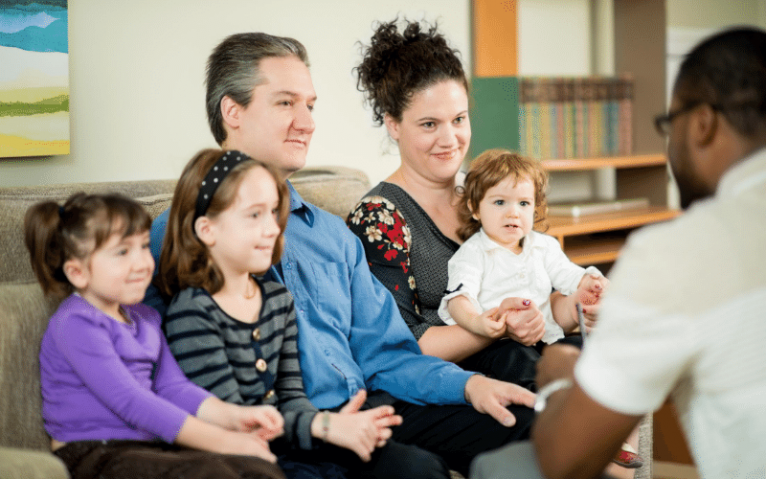Addiction may seem to affect only the drinker or drug user. However, the reality is that addiction affects everyone in the addict’s life. Thus, in a family, unhealthy behaviors can create resentment and secrecy. Some can even enable addiction. Family therapy can address many of these conflicts and help those in recovery move through treatment with the support of their family members. Let’s learn more about the true benefits of family therapy in addiction recovery.
What is Family Therapy?
Family therapy is a form of psychotherapy designed to reduce conflict among family members. It’s widespread for families affected by addiction to feel disconnected, lack of trust, and overall dysfunctional familial relationships among the members. Unlike individual therapy, family counseling focuses on relationship dynamics.
Family counseling looks at patterns that need to be adjusted, rather than focusing on one person’s sole role in the problem. These types of sessions are also known as “strengths-based treatment.” A healthy family dynamic is critical for the mental health of each family member, especially when someone is struggling with addiction or mental health disorders.
Common Reasons for Choosing Family Therapy
Addiction can quickly disrupt and create chaos within the family unit. When one member of the family struggles with drug and alcohol abuse, the rest of the system becomes negatively affected. Some of the most common reasons that may prompt the need for family therapy:
- A member of the family is struggling with a substance use disorder.
- Recently major trauma or change has impacted the entire family.
- The unexpected or tragic loss of a family member.
- Adjustment to a new family member in the home.
- Domestic violence.
- Divorce or parental conflict.
- Major life transitions.
Goals of Family Therapy
The goal is family therapy isn’t to place a band-aid over the problem and call it a day. Family therapy uses an evidence-based treatment that is meant to promote healing and address the underlying causes of family conflict. Some common goals of family therapy include:
- Help members develop and maintain healthy boundaries.
- Facilitate improved communication among members.
- Promote a better understanding of family dynamics.
- Build empathy among family members.
- Reduce conflict within the family system.
As the addict’s addiction intensifies, the family experiences more distress. Members of the family can even develop their unhealthy behaviors to cope with addiction. For example, some families enable the addict by lying for them or giving them money to avoid a fight.
Additionally, family members may stop speaking to their addicted loved ones. The lack of communication allows resentment and anger to grow.
Sometimes, family members turn to their addictive behaviors, like compulsive shopping or eating, to cover up the pain. Generally, for the health of everyone involved, family counseling is a necessary part of addiction treatment.
Benefits of Family Therapy in Addiction Treatment
Above all, family therapists know that the family is key to promoting success. Addiction therapists may recommend support groups for the family to attend, such as Al-Anon or Families Anonymous. These groups have meetings all over the country and offer support and tips for coping with a loved one in addiction. These groups help the family to heal, whether the addict is successful or not.
Family therapy can help patients and loved ones plan for a healthy future. One of the most significant decisions a patient and their family will make is aftercare planning. Some of the most significant benefits include:
- Family therapy helps the family learn communication skills that promote healing, how to manage tone to avoid triggers, and abilities to use speaking in a way that makes others feel respected and understood.
- Provide members a safe and open space to honestly discuss their feelings, thoughts, and emotions in a way that promotes trust amongst one another.
- Help each family member figure out what healthy boundaries look like to them and how to enforce these boundaries to protect their wellbeing.
- Family therapy can help members understand their role in their loved one’s recovery process, showing them how to offer ongoing support.
- Teaches family members more about triggers, emotions, and other troubles that can prevent relapse.
There’s no doubt family therapy can help everyone in many ways. Many treatment facilities offer regular family therapy sessions, and making an effort to attend can be extremely beneficial for your wellbeing and your loved one’s recovery process.
Seeking Professional Family Therapy
Without a doubt, having family members involved in treatment is beneficial in many ways. Family therapy offers the addict’s family a chance to process the pain caused by addiction. Also, to create a plan to move forward positively. It can also help the addict feel loved and supported.
Additionally, having the help of a counselor can help replace resentment and fear with honesty and connection. If you are suffering from substance abuse, you can find healing through family therapy in addiction treatment.
[/et_pb_text][/et_pb_column] [/et_pb_row] [/et_pb_section]








